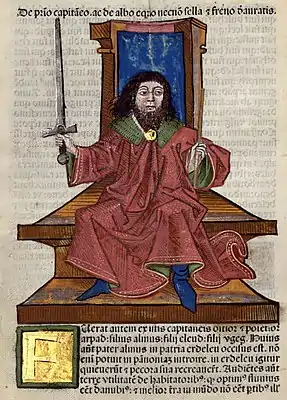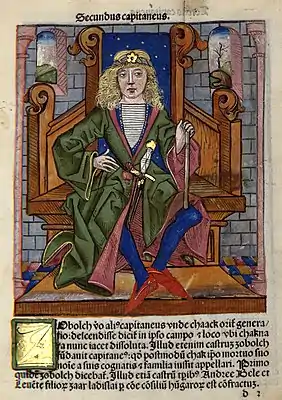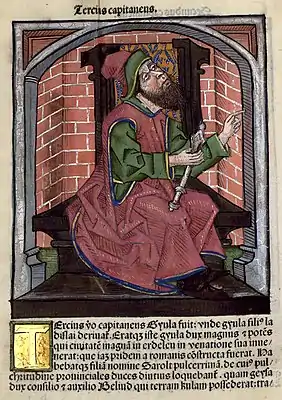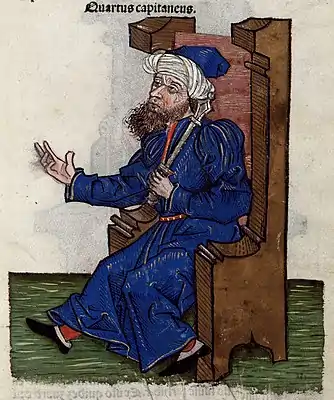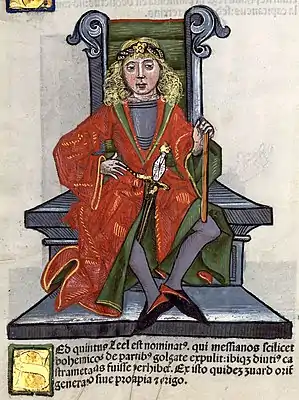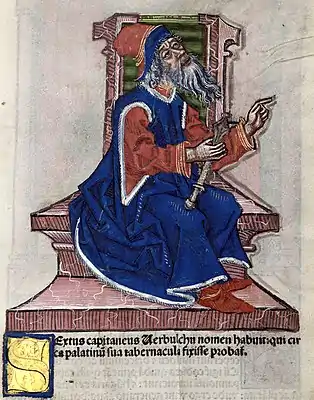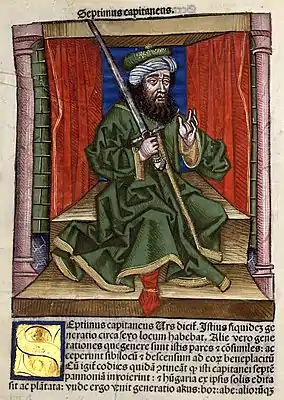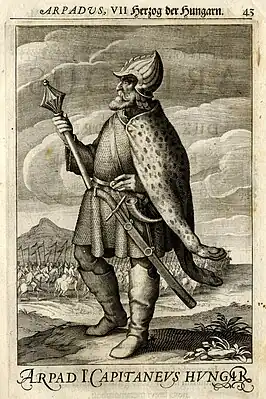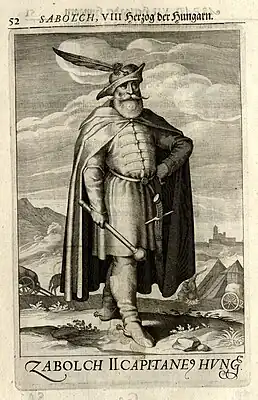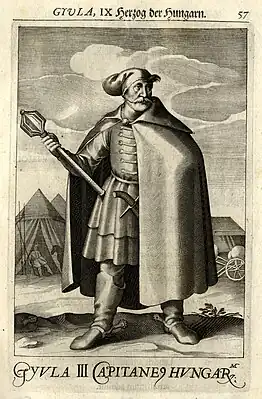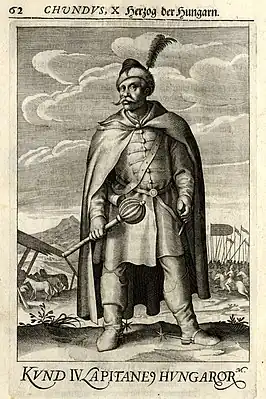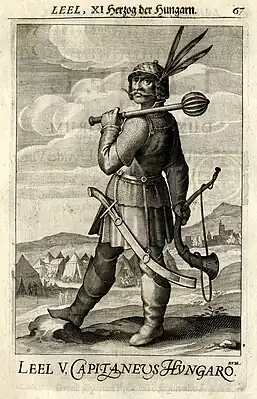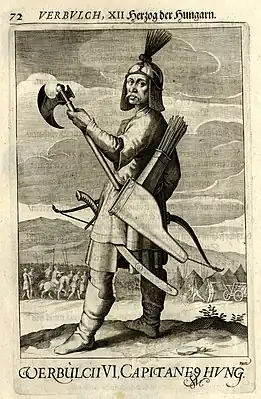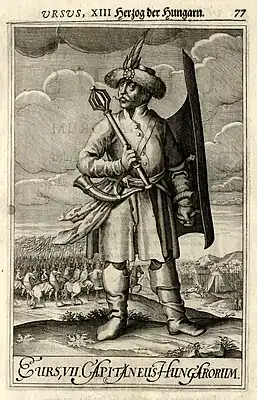Seven chieftains of the Magyars
The Seven chieftains of the Magyars (or Hungarians) were the leaders of the seven tribes of the Hungarians at the time of their arrival in the Carpathian Basin in AD 895. Constantine VII, emperor of the Byzantine Empire names the seven tribes in his De Administrando Imperio, a list that can be verified with names of Hungarian settlements. The names of the chieftains, however, are not precisely known, as the chronicles include contradictory lists, some of which have been found to be false.
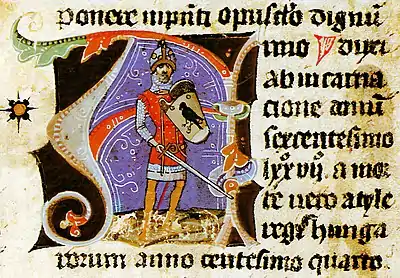

Chieftains
Constantine VII does not give the names of the chieftains of the Hungarian tribes, but describes some aspects of the leadership.
According to Anonymus
A Hungarian chronicler known as Anonymus, author of Gesta Hungarorum, names the seven chieftains as:
- Álmos, father of Árpád
- Előd, father of Szabolcs
- Ond, father of Ete
- Kend (Kond, Kund), father of Korcán (Kurszán) and Kaplon
- Tas, father of Lél (Lehel)
- Huba
- Tétény (Töhötöm), father of Horka
Most probably all persons on this list were real and significant personalities, but the list, as that of the seven chieftains who started the conquest of the Carpathian Basin, is certainly false.[1] Constantine VII names Tas as a grandson of Árpád. The relations of the early Hungarian leaders are subject of debate between historians.
According to Simon of Kéza
Hungarian chronicler Simon of Kéza names seven captains who led seven tribes in the Gesta Hunnorum et Hungarorum:
- Árpád, son of Álmos, who was the son of Előd, who was the son of Ügyek
- Szabolcs
- Gyula
- Örs
- Künd, father of Kusid and Kupian
- Lél
- Vérbulcsú ("Blood-Bulcsú"), whose name's origin is that "his father was killed by Germans in the battle of Krimhild", and for revenge, "he drank the blood of some, like wine".
This list, having more legendary elements, is even less credible than that of Anonymus: only Árpád and Szabolcs match the time of the conquest.
According to Mark of Kalt
Hungarian chronicler Mark of Kalt names seven captains who led seven tribes in the Chronicon Pictum:
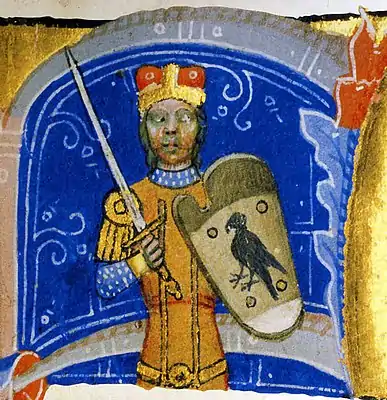 Árpád, the first captain
Árpád, the first captain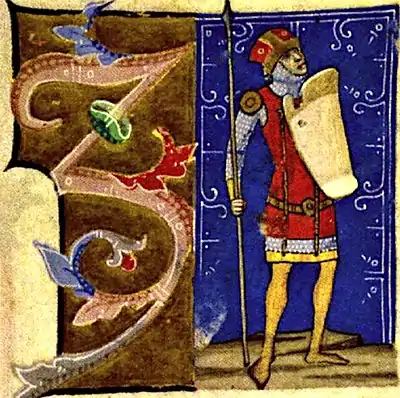 Szabolcs, the second captain
Szabolcs, the second captain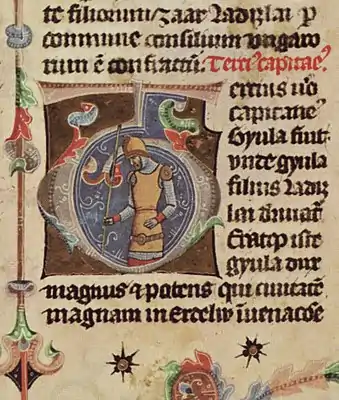 Gyula, the third captain
Gyula, the third captain Kund, the fourth captain
Kund, the fourth captain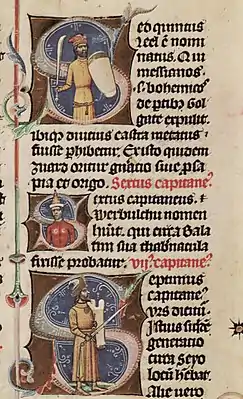
And this Captain Árpád had a special dignity in Scythia, it was the custom of his clan, according to the Scythian law and tradition, that he went alone before those who went to war and those who retreated, saying, therefore he was the first to enter this land before the other captains going to Pannonia.
According to Johannes Thuróczy
Hungarian chronicler Johannes Thuróczy names seven captains who led seven tribes in the Chronica Hungarorum:
Statues
In Budapest, Hungary, the Heroes' Square, better known as Hősök tere, has a representation of the different chieftains at the base of the column. At the base of the column is a group of seven mounted figures representing the Magyar chieftains who led the Hungarian people into the Carpathian basin. In the front is Árpád, considered the founder of the Hungarian nation. Behind him are the chieftains Előd, Ond, Kond, Tas, Huba, and Töhötöm (Tétény). Little survives in the historical record about these individuals and both their costumes and their horses are considered to be more fanciful than historically accurate.
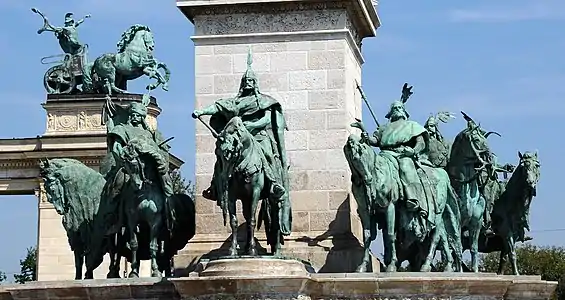 Statues of the Seven Chieftains on the Hősök tere (Heroes' Square) in Budapest, Hungary
Statues of the Seven Chieftains on the Hősök tere (Heroes' Square) in Budapest, Hungary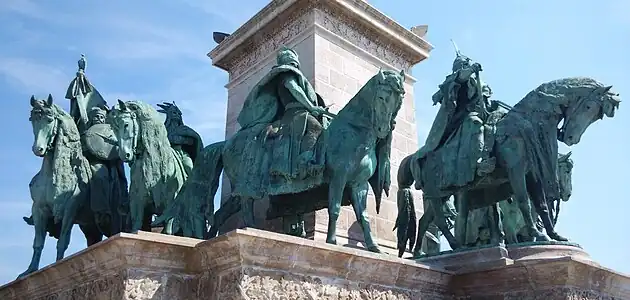 Left side view of some of the statues of the Seven chieftains of the Magyars
Left side view of some of the statues of the Seven chieftains of the Magyars Side view of two of the seven statues of the Seven chieftains of the Magyars. Left: Huba. Right: Tas
Side view of two of the seven statues of the Seven chieftains of the Magyars. Left: Huba. Right: Tas Tas, a Magyar chieftain
Tas, a Magyar chieftain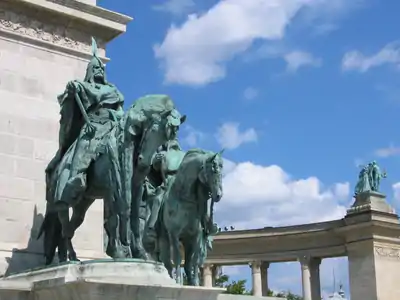 Árpád leading the other chieftains
Árpád leading the other chieftains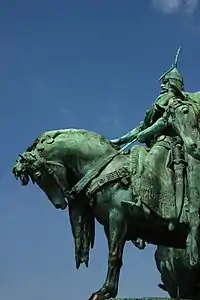 Árpád's left profile
Árpád's left profile
See also
References
- Györffy György. István király és műve. Gondolat Budapest 1983. ISBN 963-281-221-2.
- Mark of Kalt: Chronicon Pictum https://mek.oszk.hu/10600/10642/10642.htm
